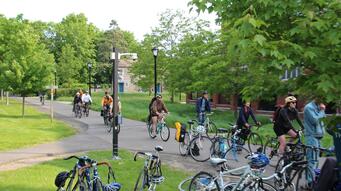Mobility
Yale in Motion
A focus on health and physical activity encourages the Yale community to be more active on campus, reduce vehicle usage, improve air quality, and reduce congestion on the roads.
Yale’s Efforts
- Over one-third of Yale employees live in the City of New Haven, and increasingly choose to walk, bike, or ride the Yale Shuttle to work.
- Yale has partnered with the city and other local employers to encourage use of the expanding infrastructure and programs for walking, biking and using transit.
- The Yale Community Carbon Fund allows those who commute to or travel for Yale to support local efficiency projects and offset their emissions.
- Bike/Walk Yale, a subgroup of the Traffic Safety Committee, manages initiatives to enhance bike and pedestrian infrastructure on campus. They also encourage active transportation through incentive programs and communications and ensure that University planning processes are holistic in their approach to transportation systems. Participating departments include the Office of Sustainability, Facilities Operations, University Planning, Public Safety, and the University Wellness Leadership Group.
What You Can Do
- Avoiding single occupancy vehicle use can save you time and money while improving air quality and reducing emissions. Learn more about the resources Yale provides.
- Join the fun. GoNewHavenGo offers resources and programming to make sustainable transportation easy. CT Rides offers free commuter counseling to all Yale affiliates.
- Concerned about your safety? Download the LiveSafe app for resources to keep you safe while walking and biking in New Haven.
Our Objectives and Goals
Alternative Transportation Systems
Enhance and support systems for alternative and active transportation
Yale staff members came together with New Haven mobility organizations for the annual Bike to Work Breakfast on May 16. This year’s gathering celebrated a special milestone: the long-awaited opening of a section of the Farmington Canal Trail under Whitney Avenue. The event attracted more than fifty cyclists, who came to socialize and enjoy complimentary breakfast on their way to the office. Participants connected with representatives from the Yale Office of Sustainability, the Farmington Canal Rail-to-Trail Association, Yale Environmental Health & Safety, and CTrides, as well as companies operating new e-scooter and e-bike rental services in New Haven.
Sustainable Transportation Framework
By 2019, complete a Sustainable Transportation Framework and related analyses for enhancing sustainable transportation infrastructure on and across Yale campuses.
This goal was achieved in 2018. The university continues to coordinate with the city of New Haven on transportation improvements. Progress has been made in converting streets from one-way to two-way to help slow the speed of traffic and improve flow and safety for various users. The city’s South Frontage Road infrastructure project is projected to be bid in early 2026. This will update traffic signaling and add raised intersections for improved safety.
Campus Circulation
By 2025, enhance Yale’s strategy for safe, convenient, and resilient circulation around campus.
Over the past year, Yale Transit has made substantial service enhancements by introducing new day and night routes for the Yale Shuttle with fewer stops to optimize efficiency across the larger service area. These improvements have successfully reduced wait times, and we continue to receive positive feedback from the community regarding both the expanded shuttle boundaries and the upgraded service offerings.
Electric Vehicle Infrastructure
By 2025, increase electric vehicle charging infrastructure by 250% above 2019 levels.
This goal was achieved in 2023. We currently have seventy-nine EV charging stations throughout central and medical campuses and aim to add at least one more EV station to the map based on location and peak times data. In 2025, the university coordinated with the city of New Haven to designate convenient e-scooter locations around campus for this city-wide micromobility initiative.
Sustainable Transportation Choices
Advance transportation choices that improve human health and environmental vitality
Sustainable Commuting
By 2025, increase the proportion of Yale community members commuting to campus using sustainable transportation modes by 10% above 2015 levels.
Results from the 2025 Transportation Survey are forthcoming. Our 2023 Transportation Survey results demonstrated a 1.2 percent increase in Yale commuters’ use of sustainable transportation modes since 2015, as well as a 2 percent increase in the use of public transit since 2021. To explore the most current campus mobility data, visit the Sustainability Data Hub.







